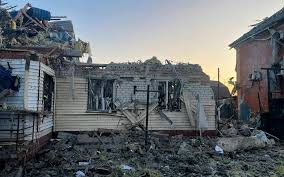A state of emergency has been declared in the Kursk region of Russia, as a rare cross-border attack by Ukrainian troops continued on Wednesday.
The acting regional governor, Alexei Smirnov, said the move was necessary “to eliminate the consequences of enemy forces coming into the region”.
Russian officials said at least five civilians had been killed and 31 wounded, six of them children, since the start of the incursion.
Ukraine has not officially commented and the depth of the incursion remains unclear.
On Tuesday morning, up to 1,000 Ukrainian troops, as well as 11 tanks and more than 20 armoured combat vehicles, entered Russia near the town of Sudzha, Moscow said.
Fighting reportedly took place in a number of villages throughout Tuesday, with local authorities urging residents to limit their movements and all public events cancelled.
A number of air alerts were issued in Kursk and footage posted online – verified by the BBC – showed fighter jets flying low over the region, with smoke rising from areas on the ground.
Thousands of people were evacuated from border areas and doctors were being drafted in from other cities, Mr Smirnov said.
Ukrainian incursions into Russian territory have been extremely rare since Russia launched its full-scale invasion in February 2022.
On Wednesday evening, Ukrainian MP Oleksiy Honcharenko said the Ukrainian army had established control over the Sudzha gas hub, a major gas facility involved in the transit of natural gas from Russia to the EU via Ukraine, which has continued despite the war.
It is the only point of entry for Russian gas into the EU.
Although the claim has not been verified by the BBC, Mr Honcharenko’s comment was the first confirmation of an incursion into Russian territory by a Ukrainian official.
Mr Honcharenko said on Facebook that while he did not know what the “plan” behind the incursion was, it would show “Europeans and Americans that… Russia can and needs to be attacked”.
Russia’s military response to the incursion will be one of Andrei Belousov’s first big leadership tests as the country’s new defence minister, after he replaced his long-serving predecessor Sergei Shoigu in May.
Speaking to the BBC’s Newshour, Mr Honcharenko added that “from a military point of view, we are trying to take back the initiative”.
—BBC

